Curiosité, entreprises intellectuelles et
explorations scientifiques dans les écrits de femmes à l’époque moderne (XVIe-XVIIIe siècles)
Colloque international, 18-19 novembre 2021
CRINI-EA 1162
avec le Séminaire interdisciplinaire « Le Concert des Nations à l’époque moderne (XVIe-XVIIIe siècles), CRINI, CRHIA, L’AMO
et la collaboration du projet de recherche « Another Humanism: Gendering Early Modern Libertinism and the Boundaries of Subjectivity » (project funded by Riksbankens Jubileumsfond), Université de Stockholm (Suède)
La thématique proposée envisage d’étudier la place des femmes dans le développement des idées scientifiques de la Renaissance aux Lumières à partir de la notion de curiosité.
Les travaux récents menés sur le rôle des femmes dans la constitution des cabinets de curiosité, au cœur du tournant moderne de l’histoire des collections, ont fait ressortir une dynamique majeure, jusqu’alors ignorée mais pourtant déterminante dans différents contextes de politiques culturelles européennes[1].
L’objet de ce colloque international invite à considérer la part des questionnements intellectuels des femmes dans la République des Lettres. Une série de questions se posent, en effet, sur la contribution de la curiosité des femmes dans le renouveau des savoirs à l’époque moderne et de la scientia en particulier.
Quelle construction d’une subjectivité féminine ressort de ce rapport nouveau aux choses naturelles (naturalia) ? La curiosité reste-t-elle marquée par la dimension transgressive qui en avait pesé sur elle, durant le Moyen Age notamment ?
Ce désir de savoir (libido sciendi) porte-t-il la marque d’un goût exclusif pour le secret et les arcanes (incluant pratiques médicales, recettes, usage des drogues et poisons) à la Renaissance ?[2]? Comment, par ailleurs, la curiosité féminine s’est-elle trouvée aiguisée par le goût de l’étrange et de la merveille ? Enfin, la thématique invite à repenser le rapport de la curiosité à la rationalité scientifique qui modifie le champ de la science à l’époque moderne.
Quelques lignes thématiques pourront être considérées, de manière non exhaustive :
Curiosité et savoirs en question
- objets de savoirs et instruments de connaissance de la nature dans les cabinets de curiosité, contribuant au renouveau de la curiosité naturaliste, liée à de nouveaux instruments de connaissance : les récits et les données d’explorations extra-européennes ; la nature comme objet de la libido sciendi
- l’émergence d’une conscience féminine de l’utilité du savoir, au-delà de la vana curiositas
- curiosité et secrets aux frontières de l’hérésie
- la curiosité comme moteur d’un questionnement des doctrines philosophiques
- les femmes lectrices des écrits naturalistes
- Les femmes et la nature : de l’histoire naturelle à la philosophie naturelle comme objets d’une curiosité au tournant de la révolution scientifique (XVIe-XVIIIe siècles)
- curiosité, expérimentation, empirisme
Méthodes, pratiques et discours savants
- curiosité : expression rhétorique et sophistication stylistique
-les arguments d’une défense de la curiosité
- les femmes et les institutions scientifiques, cabinets, cercles, académies, en Europe XVIIe- XVIIIe siècles. Réseaux et correspondances
La thématique du colloque s’inscrit dans les travaux de recherche du laboratoire CRINI, au Séminaire interdisciplinaire et transversal « Le Concert des Nations à l’époque moderne » qui réunit des chercheurs du CRINI, CRHIA, L’AMO. Il s’inscrit par ailleurs dans le cadre du projet de recherche ARCO, « Les arts du consensus dans le concert des Nations. Penser les formes d’instauration de la concorde à l’époque moderne (XVIe-XVIIIe siècles)/ The Arts of Concord in the Concert of Nations : Instituting Concord through Scientific Cooperation in the Modern Era », qui fédère les travaux du séminaire depuis 2019.
Le relief apporté aux échanges interculturels, l’interdisciplinarité seront appréciées
Bibliographie sommaire :
Beugnot, B., « La Curiosité dans l’anthropologie classique », in U. Döring, A. Lyroudias, and R. Zaiser (eds.), Ouverture et dialogue: Mélanges offerts à Wolfgang Leiner, Tübingen, 1988, pp. 17–30.
Blair, A. , « Curieux, curieusement, curiosité », Littératures classiques, 47, 2003, pp. 101–7.
Bolufer, Mónica, « Medicine and the Querelle des Femmes in Early Modern Spain », Medical History Supplements, 29, 2009, pp. 86-106.
Céard, J. (ed.), La curiosité en France à la Renaissance, Paris, SEDES, 1986.
Cottegnies, Line, John Thompson, Sandrine Parageau, Women and Curiosity in Early Modern England and France, Leiden-Boston, Brill, 2016.
Daston, L., and Park, K., Wonders and the Order of Nature, 1150–1750, New York, MIT Press, 1998.
Evans, R.J. W., Alexander Marr, Curiosity and Wonder from the Renaissance to the Enlightenment, Londonc, Ashgate, 2016.
Findlen, Paula, « Ideas in the Mind : Gender and Knowledge in the Seventeenth Century », Hypatia, vol. 17, n°1 (Winter 2002), pp. 183-196.
Goldgar, A., Impolite Learning: Conduct and Community in the Republic of Letters 1680–1750, New Haven, Yale University Press, 1995.
Harrison, Peter, « Curiosity, Forbidden Knowledge, and the Reformation of Natural Philosophy in early Modern England », Isis, Jun. 2001, vol. 92 pp. 265-290.
Houdard, Sophie, Nicole Jacques-Chaquin (éd.), Curiosité et Libido Sciendi. De la Renaissance aux Lumières, Lyon, ENS Editions, 1998, 2 vol.
Kenny, Neil, The Uses of Curiosity in Early Modern France and Germany, Oxford, Oxford University Press, 2004.
Labhardt, A., « Curiositas : Notes sur l’histoire d’un mot et d’une notion », Museum Helveticum, 1960, 17, pp. 206-224.
Long, Kathleen P., Gender and Scientific Discourse in Early Modern Culture, London, Ashagte, 2010.
Pellegrin, Marie-Frédérique (ed.), « Penser au féminin au XVIIe siècle », Revue philosophique de la France et de l’étranger, t. 203, n°3, juillet-septembre, 2013.
Pomata, Gianna, « Was there a Querelle des Femmes in Early Modern Medicine ? », Arenal, julio-diciembre 2013, 20 :2, pp. 314-341.
Ray, Meredith, K., Daughters of Alchemy. Women and Scientific Culture in Early Modern Italy, Cambridge Mass., Harvard University Press, 2015.
Ross, Sarah Gwyneth, The Birth of Feminism. Woman as Intellect in Renaissance Italy and England, Cambridge Mass., Harvard University Press, 2009.
Schiebinger, L., « Gender in Early Modern Science », in D. R. Kelley (ed.), History and the Disciplines: The Reclassification of Knowledge in Early Modern Europe, New York, University of Rochester Press, 1997, pp. 319–34.
- « European Women in Science », Science in Context, 15 (4), 2002, pp. 473-481.
Schwartz, Janelle A., Nhora Lucia Serrano, Curious Collectors, Collected Curiosities : An Interdisciplinary Study, Newcastle upon Tyne: Cambridge Scholars Publishing, 2010.
Trotot, Caroline, C. Delahaye, I. Mornat, Femmes à l’oeuvre dans la construction des savoirs. Paradoxes de la visibilité et de l’invisibilité, Collection Savoirs en texte, laboratoire Littératures, Savoirs et Arts, Université Gustave Eiffel, 2020.
Whaley, Leigh, Women and the Practice of Medical Care in Early Modern Europe, 1400-1800, London, Palgrave Macmillan, 2011.
Waller, Gary, The Female Baroque in Early Modern English Literary Culture : From Mary Sidney to Aphra Behn, Amsterdam University Press, 2020 (jstor) : 2. The Female Baroque, pp. 47-74.
Whitaker, K. « The Culture of Curiosity », in : Jardine, N., Scord. J.A, Spary E.C (eds.), Cultures of Natural History, Cambridge, 1996, pp. 75-90.
Les propositions de communications, de 300 mots accompagnées d’une notice biographique d’une page maximum (institution de rattachement, CV, publications significatives) seront à adresser avant le 15 février 2021 à Karine Durin (karine.durin@univ-nantes.fr), conferencecuriositynantes@gmail.com.
Langues du colloque : français, anglais.
Les communications n’excèderont pas 30 minutes.
COMITÉ SCIENTIFIQUE :
Pierre Carboni, CRINI
Nicolas Correard, L’AMO
Karine Durin, CRINI
Eric Schnakenbourg, CRHIA
Carin Franzén, Université de Stockholm, Suède
Nan Gerdes, Université Roskilde, Copenhague, Danemark
Susana Åckerman, Stockholm
Curiosity, Intellectual Enterprises and
Scientific Explorations in the Writings of Women in the Early Modern Period (16th-18th centuries)
International Conference 18-19/11/2021
CRINI-EA 1162
with the collaboration of the interdisciplinary seminar « Le Concert des Nations à l’époque moderne (XVIe-XVIIIe siècles) », CRINI, CRHIA, L’AMO (University of Nantes)
and the research project :« Another Humanism: Gendering Early Modern Libertinism and the Boundaries of Subjectivity » (project funded by Riksbankens Jubileumsfond), Stockholm University (Sweden)
The subject of this international conference is the participation of women in the development of scientific ideas from the Renaissance to the Enlightenment. It welcomes reflections on women’s intellectual contributions to the creation of the « Republic of Letters », and how female curiosity was connected to the development of a new rationality that opened new paths towards modern science, while simultaneously being stimulated by the marvellous and the strange, as was manifest in the creation of scientific cabinets and collections of rare objects. It aims at encouraging reflections on the concept of female scientific curiosity. Recent studies on women’s contribution to the cabinets of scientific curiosities has brought to light important dynamics hitherto unapproached in previous studies, showing major differences on the constitution of these collections, within different European contexts[3]. This can open new paths for studying the different processes that led to the renovation of of knowledge in XVIth-century Europe, particularly regarding the concept of scientia. This will allow us to discuss the construction of a female subjectivity emerged from new approaches towards collections of naturalia, as female scientific curiosity became imbued with a profound sense of cultural and social transgression. The desire for knowledge (libido sciendi), marked by an inclination towards the arcane and the secret, including experimentation with medical practices and recipes, and the use of poisons and drugs, will be discussed as an aspect of the emergence of a female scientific identity, trascending vana curiositas and contributing to the development of scientific discourse through women’s appropriation of libido sciendi.
Papers are welcome on the following (and related) topics :
Objects and instruments for the knowledge of nature found in curiosity cabinets.
Changing attitudes towards the understanding of nature based on transatlantic and transpacific exploration.
The study of nature as libido sciendi. Curiosity and secrecy on the verge of heresy.
Female scientific curiosity and the questioning of philosophical doctrines
Women lecturers and writings on natural history
Women and nature : natural history and natural philosophy as subjects of female curiosity in the scientific revolution
Female curiosity, experimentation, empiricism
Female curiosity and rhetorical expression
Women and scientific institutions, XVI-XVIIIth centuries.
Women and erudite networks.
This conference is part of the academic activities of the CRINI and the Seminar for Interdisciplinaryt Research « Le Concert des Nations à l’époque moderne » (CRINI, CRHIA, L’AMO). It is also part of the following resrarch project : ARCO, « The Arts of Concord in the Concert of Nations : Instituting Concord through Scientific Cooperation in the Modern Era » (since 2019).
Selected bibliography :
Beugnot, B., « La Curiosité dans l’anthropologie classique », in U. Döring, A. Lyroudias, and R. Zaiser (eds.), Ouverture et dialogue: Mélanges offerts à Wolfgang Leiner, Tübingen, 1988, pp. 17–30.
Blair, A. , « Curieux, curieusement, curiosité », Littératures classiques, 47, 2003, pp. 101–7.
Bolufer, Mónica, « Medicine and the Querelle des Femmes in Early Modern Spain », Medical History Supplements, 29, 2009, pp. 86-106.
Céard, J. (ed.), La curiosité en France à la Renaissance, Paris, SEDES, 1986.
Cottegnies, Line, John Thompson, Sandrine Parageau, Women and Curiosity in Early Modern England and France, Leiden-Boston, Brill, 2016.
Daston, L., and Park, K., Wonders and the Order of Nature, 1150–1750, New York, MIT Press, 1998.
Evans, R.J. W., Alexander Marr, Curiosity and Wonder from the Renaissance to the Enlightenment, Londonc, Ashgate, 2016.
Findlen, Paula, « Ideas in the Mind : Gender and Knowledge in the Seventeenth Century », Hypatia, vol. 17, n°1 (Winter 2002), pp. 183-196.
Goldgar, A., Impolite Learning: Conduct and Community in the Republic of Letters 1680–1750, New Haven, Yale University Press, 1995.
Harrison, Peter, « Curiosity, Forbidden Knowledge, and the Reformation of Natural Philosophy in Early Modern England », Isis, Jun. 2001, vol. 92 pp. 265-290.
Houdard, Sophie, Nicole Jacques-Chaquin (éd.), Curiosité et Libido Sciendi. De la Renaissance aux Lumières, Lyon, ENS Editions, 1998, 2 vol.
Kenny, Neil, The Uses of Curiosity in Early Modern France and Germany, Oxford, Oxford University Press, 2004.
Labhardt, A., « Curiositas : Notes sur l’histoire d’un mot et d’une notion », Museum Helveticum, 1960, 17, pp. 206-224.
Long, Kathleen P., Gender and Scientific Discourse in Early Modern Culture, London, Ashagte, 2010.
Pellegrin, Marie-Frédérique (ed.), « Penser au féminin au XVIIe siècle », Revue philosophique de la France et de l’étranger, t. 203, n°3, juillet-septembre, 2013.
Pomata, Gianna, « Was there a Querelle des Femmes in Early Modern Medicine ? », Arenal, julio-diciembre 2013, 20 :2, pp. 314-341.
Ray, Meredith, K., Daughters of Alchemy. Women and Scientific Culture in Early Modern Italy, Cambridge Mass., Harvard University Press, 2015.
Ross, Sarah Gwyneth, The Birth of Feminism. Woman as Intellect in Renaissance Italy and England, Cambridge Mass., Harvard University Press, 2009.
Schiebinger, L., « Gender in Early Modern Science », in D. R. Kelley (ed.), History and the Disciplines: The Reclassification of Knowledge in Early Modern Europe, New York, University of Rochester Press, 1997, pp. 319–34.
- « European Women in Science », Science in Context, 15 (4), 2002, pp. 473-481.
Schwartz, Janelle A., Nhora Lucia Serrano, Curious Collectors, Collected Curiosities : An Interdisciplinary Study, Newcastle upon Tyne: Cambridge Scholars Publishing, 2010.
Trotot, Caroline, C. Delahaye, I. Mornat, Femmes à l’oeuvre dans la construction des savoirs. Paradoxes de la visibilité et de l’invisibilité, Collection Savoirs en texte, laboratoire Littératures, Savoirs et Arts, Université Gustave Eiffel, 2020.
Whaley, Leigh, Women and the Practice of Medical Care in Early Modern Europe, 1400-1800, London, Palgrave Macmillan, 2011.
Waller, Gary, The Female Baroque in Early Modern English Literary Culture : From Mary Sidney to Aphra Behn, Amsterdam University Press, 2020 (jstor) : 2. The Female Baroque, pp. 47-74.
Whitaker, K. « The Culture of Curiosity », in : Jardine, N., Scord. J.A, Spary E.C (eds.), Cultures of Natural History, Cambridge, 1996, pp. 75-90.
Please send 300-words proposals (lenght 30mn) and a brief biographical note to : karine.durin@univ-nantes.fr, conferencecuriositynantes@gmail.com, by 15/02/2021
Languages : English and French
Scientific Board:
Pierre Carboni, CRINI
Nicolas Correard, L’AMO
Eric Schnakenbourg, CRHIA
Karine Durin, CRINI
Carin Franzén, Université de Stockholm, Suède
Nan Gerdes, Université Roskilde, Danemark
Susana Åckerman, Stockholm




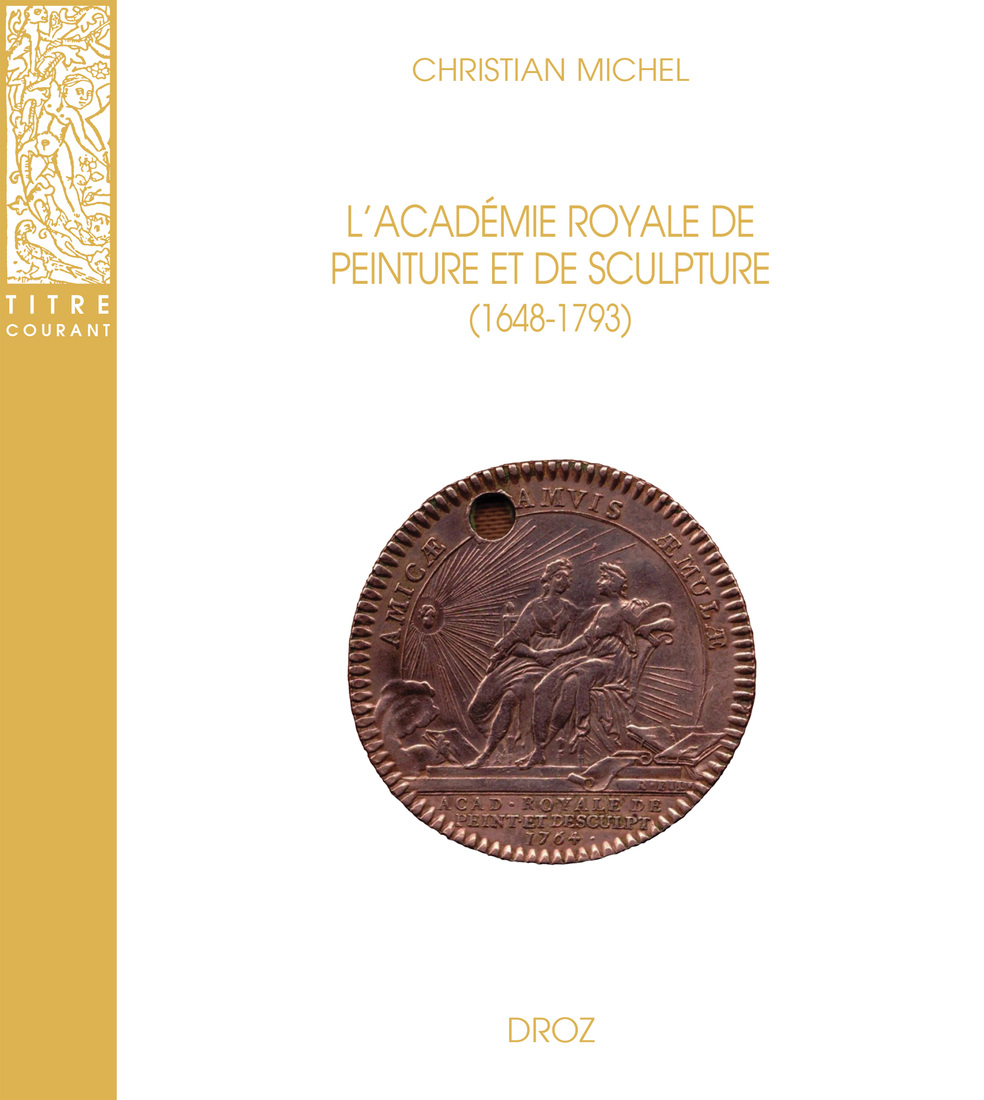 Christian MICHEL, L'Académie royale de peinture et de sculpture (1648-1793). La naissance de l'École française, Genève, Droz, 2024.
Christian MICHEL, L'Académie royale de peinture et de sculpture (1648-1793). La naissance de l'École française, Genève, Droz, 2024.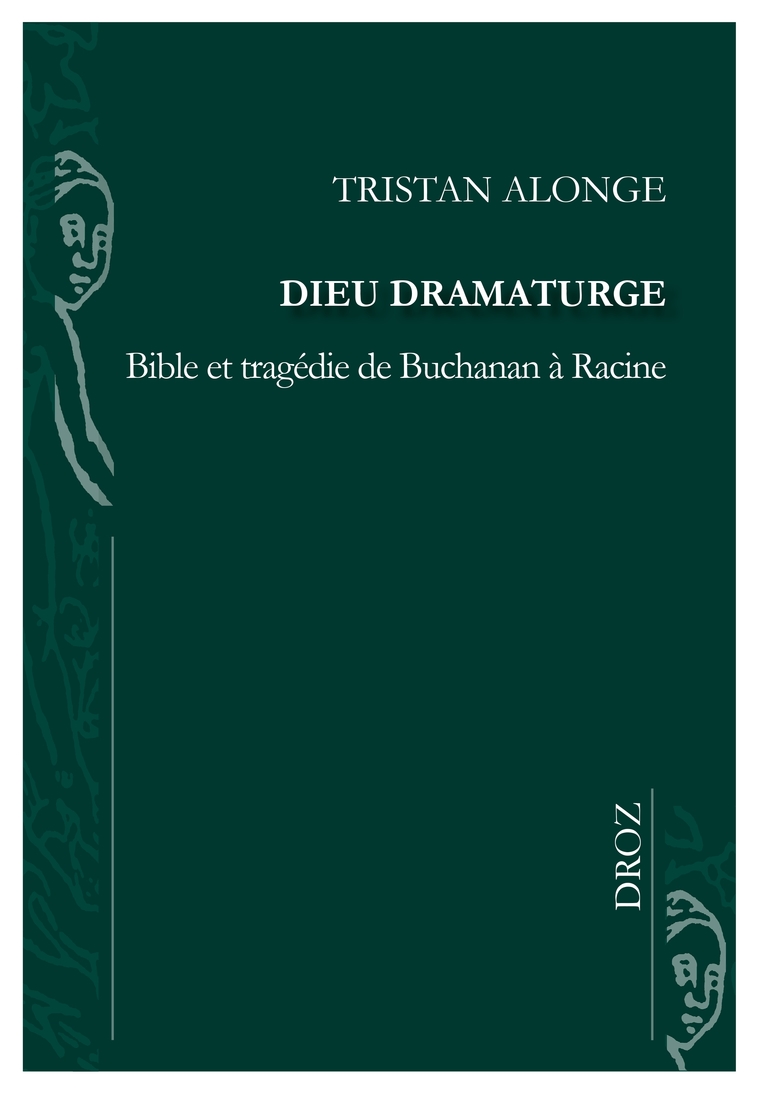 Tristan ALONGE, Dieu dramaturge. Bible et tragédie de Buchanan à Racine, Genève, Droz, 2024.
Tristan ALONGE, Dieu dramaturge. Bible et tragédie de Buchanan à Racine, Genève, Droz, 2024.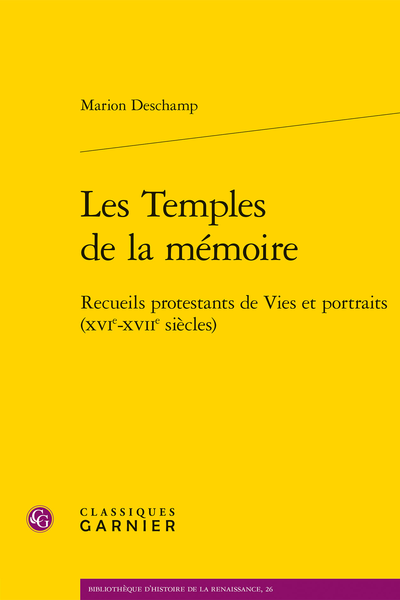 Marion Deschamps, Les Temples de la mémoire. Recueils protestants de Vies et portraits (xvie-xviie siècles), Paris, Classiques Garnier, 2024.
Marion Deschamps, Les Temples de la mémoire. Recueils protestants de Vies et portraits (xvie-xviie siècles), Paris, Classiques Garnier, 2024.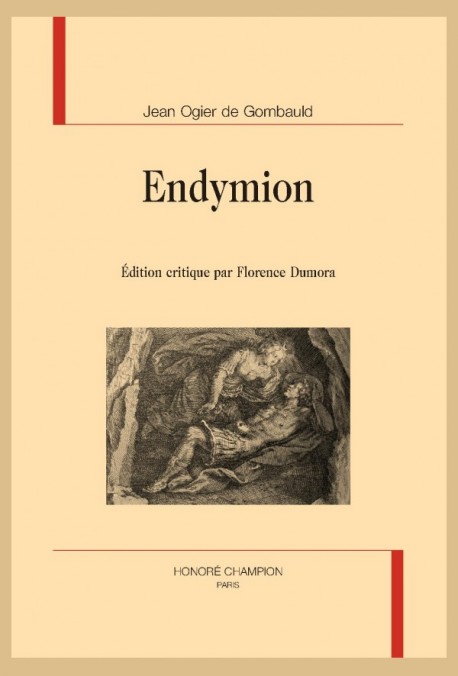 Jean Ogier de Gombauld, Endymion, édition critique par Florence Dumora, Paris, H. Champion, 2024.
Jean Ogier de Gombauld, Endymion, édition critique par Florence Dumora, Paris, H. Champion, 2024.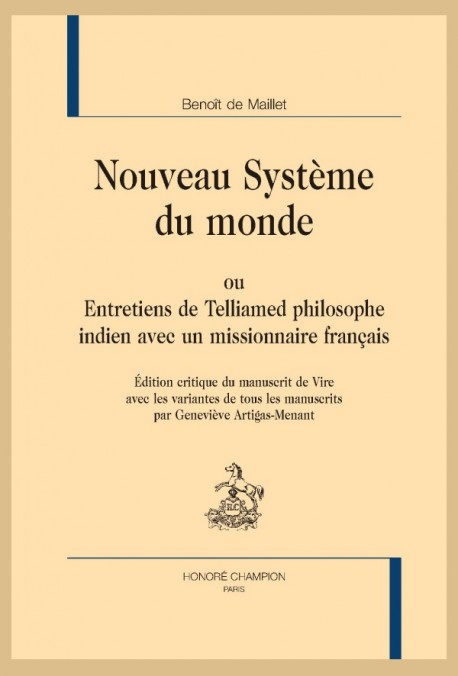 Benoît de Maillet, Nouveau système du monde, édition critique du manuscrit de Vire avec les variantes de tous les manuscrits par Geneviève Artigas-Menant, Paris, H. Champion, 2024.
Benoît de Maillet, Nouveau système du monde, édition critique du manuscrit de Vire avec les variantes de tous les manuscrits par Geneviève Artigas-Menant, Paris, H. Champion, 2024.